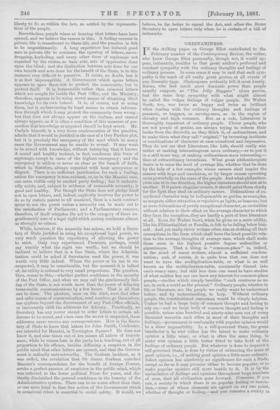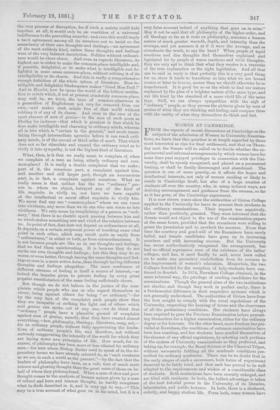ORDINARINESS.
IN the striking paper on George Eliot contributed to the February number of the Contemporary Review, the writer, who knew George Eliot personally, though not, it would ap- pear, intimately, testifies to that great author's profound and constant sympathy with the ordinary thoughts and feelings of ordinary persons. In some sense it may be said that such sym- pathy is the mark of all really great genius, at all events of any dramatic type. Shakespeare evidently felt it most keenly. Burns, who had much more dramatic power than people usually suppose, as "The Jolly Beggars" alone proves, had the same deep sympathy with what might almost be called the vulgar feelings of vulgar people. Sir Walter Scott, too, was twice as happy and twice as brilliant when dealing with the ordinary thoughts and. feelings of peasants, or beggars, or serving-men, as in the region of chivalry and high romance. But as a rule, Literature is thoroughly impatient of ordinary people. Clever people, who are not people of genius, are always trying to redeem their books from the discredit, as they think it, of ordinariness, and to make them what they call " original," by inventing incidents or combinations of character at once unnatural and impressive. They do not see that Literature, like Life, should really aim rather at making interestinguees more ordinary,—or to put it in a still truer way, at making ordinariness more interesting,— than at extraordinary inventions. What great philanthropists desire is to raise the level of average life, whether that be done by the help of a few examples whose careers shall inspire the masses with hope and emulation, or by larger causes operating more powerfully on the mass of the people. And what philanthro- pists aim at in one direction, the higher literature should aim at in another. If it paints singular careers, it should paint them chiefly for the light they shed on ordinary careers. Delineations of ex- ceptional character may be indispensable as guides, as examples, as magnets either attractive or repulsive, as lights, as beacons; but as more delineations of purely exceptional character, as curiosities without relation to their effect on the average character to which they form the exception, they are hardly a part of true literature at all, Even Sir Walter Scott, when he gives us a mere oddity, like his Flibbertigibbet or ]fenella, is felt to be falling below him- self. And yet really clever writers often aim at clothing all their conceptions in the form which shall have the least possible rela- tion to the average thoughts of average men, which shall make them seem in the highest possible degree unfamiliar or gigantesque. That a thing is " common-place " is, indeed, in the mind of many writers, almost a sufficient condem- nation; and, of course, it is quite true that one does not want to have the multiplication-table, or what is as well known as the multiplication-table, continually dinned into one's weary ears ; but still less does one want to have studios of what neither has nor can have any interest for common-place people,—studies which simply bewilder "such creatures as we are, ifi such a world as the present." Ordinary people, whether in life or literature, are the people we really want to understand better, and by -understanding, to help. Without ordinary people, the constitutional statesman would be simply helpless. Unless he had a large body of common thought and feeling to rely on,—and no large body of common thought and feeling is possible, unless nine hundred and ninety-nine men out of every thousand resemble each other in most of their thoughts and feelings,—government in conformity with popular opinion would be a sheer impossibility. In a self-governed State, the great benefactor is he whe either has the talent• to make ordinary opinion a little wiser, or what is often the same thing, to make wise opinion a little better fitted to take hold of the feelings of ordinary people. But whatever is done to improve a self-governed State, is done by virtue of enhancing the mass of good opinion, i.e., of making good opinion a little more ordinary. Select opinion has absolutely no significance for such a State, except so far as it may promise either to become popular, or to make popular opinion still mere hostila to it. It is by the assimilation of feelings and opinions throughout large numbers of men, that all civilisation goes forward. Conceive, if you can, a society in which there is no popular feeling or comae- tion,—none of whose elements are agreed on any one point, whether of thought or feeling,—and you conceive a society in
the very process of disruption, for if such a society could hold together at all, it would only be on condition of a universal indifference to the prevailing anarchy ; and even this would imply a tacit agreement among all its members not to insist on the ascendancy of their own thoughts and feelings,—an agreement of the most unlikely kind, unless these thoughts and feelings were of the very faintest description. Politics without ordinari- ness would be sheer chaos. And even as regards literature, its highest use is either to make the common-place intelligible and, if possible, delightful, or to make what is intelligible and de- lightful in some sense common-place, without robbing it of its intelligibility or its charm. And this is really a comprehensive enough definition of the whole sphere of literature. How in- telligible and delightful Shakespeare makes "Good Man Dull!" And in Hamlet, how he opens the world of the loftiest medita- tion to minds which, if not at present absolutely common-place, may well be, we trust, the type of common-placeness in a generation of Englishmen not very far removed from our own,—and makes such minds free of that world without robbing it of any of its charm. And even in the case of the most obscure of men of genius--in the ease of such poets as Shelley for instance—that which is greatest is that which he does make intelligible and charming to ordinary minds, whereas all in him which is "caviare to the general," and needs trans- lating through intermediate agencies before it can reach ordi- nary minds, is of the second or third order of merit. That which does not so far stimulate and expand the ordinary mind as to vivify it into sympathy, is not the highest kind of literature.
What, then, is it that we really mean to complain of, when we complain of a man as being utterly ordinary and com- mon-place ? It is really a double complaint that we make ; part of it, the conscious part, a complaint against him, and another and still larger part, though an unconscious part, is, in fact, a complaint against ourselves. What we really mean is that neither has the too " ordinary " per- son to whom we object, betrayed any of the kind of life requisite to vivify us, nor have we been capable of the intellectual or moral effort requisite to vivify him. We never find any one " common-place " whom we can rouse into vividness, any more than we do one who can rouse us into vividness. We only mean by complaining of a person as ordi- nary," that there is no electric spark passing between him and ms which makes something new and, vivid of the relation between us. In point of fact, that does not depend on ordinariness at all. It depends on a certain reciprocal power of touching some vital point in each other, which may result quite as easily from "ordinariness," in either or both, as from extraordinariness. It is not because people are like us in our thoughts and feelings, that we find them uninteresting. It is because they do not excite our own thoughts and feelings ; but this they may do no worse, or oven better, through having the same thoughts and feel- ings as ours in a more active form, than through having different thoughts and feelings altogether. The mere confluence of different streams of feeling is itself a source of interest,—as indeed the impulse given to private feeling by every great popular manifestation of the same feeling sufficiently shows.
But though we do not believe in the justice of the com- plaints which people who are or who regard themselves as clever, bring against others for being "so ordinary,"—for by the very fact of the complaint such people show that they are incapable of striking the light out of others which real genius can strike out of any one,—we do think that " ordinary " people have a plausible ground of complaint against men of genius, namely, that they have created almost everything,—law, philosophy, theology, literature, song, art,— for us ordinary people, without fully appreciating the limita- tions of ordinary people's life, and therefore, not without seriously exaggerating the intensity of the world for which they are laying flown new principles of life. How much, for in- stance, of philosophy has been more or less vitiated for ordinary men,—for men whom Bishop Butler used to speak of in the de- precatory terms we have already referred to, as "such creatures as we are, in such a world as the present,"—by the fact that the leaders of philosophy have been, as a rule, men of much more intense and glowing thought than the great mass of those on be- half of whom they philosophised. When a man of slow and poor thought comes to the analysis of human nature given by a man of refined and keen and intense thought, he hardly recognises what he finds described in it, and is very apt to say,—" This may be a true account of what goes on in his mind, but it is a
very false account indeed of anything that goes on in mine." May it not be said. that all philosophy of the higher order, and all theology so far as it rests on philosophy, assumes a human nature of much greater warmth, depth, and intensity than the average, and yet assumes it to if it were the average, and so overshoots the truth, to say the least? When people of tepid emotions and dim thoughts find themselves explained and legislated for by people of warm emotions and vivid thoughts, they are very apt to think that what they receive is a travestie of the true explanation or the right legislation. And all that can be said in reply is that probably this is a very good thing for us, since it feuds to transform us into what we are bound sooner or later to become, sooner than we should otherwise be 90 transformed. It is good for us on the whole to find our nature explained by the plan of a brighter nature of the same type, and our life tried by the standard of a more vivid life of the same type. Still, we can always sympathise with the sigh of " ordinary " people, as they peruse the pictures given by men of genius of what they are thinking and feeling, and compare them with the reality of what they themselves do think and feel.



































 Previous page
Previous page